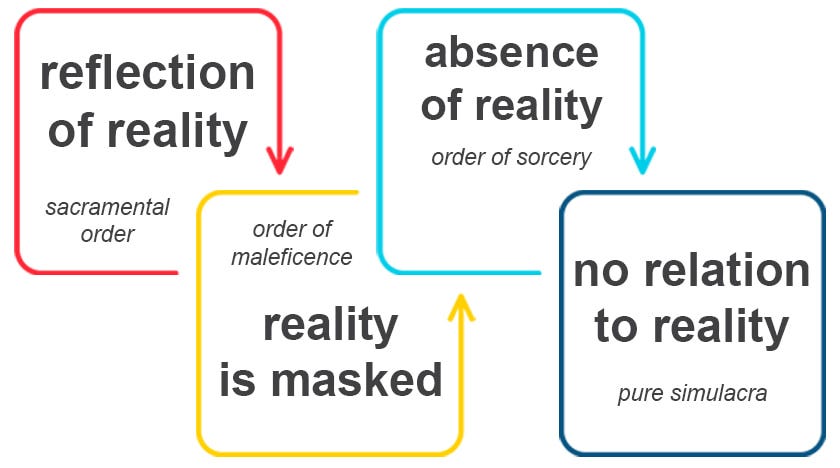Baudrillard's Kipper and the Great Reset
The long and winding road from authentic kippers to the Great Reset

Long-time followers may recall that I like to consider myself something of an old salty sea dog and a man of the salty brine. I have a life-long fixation and love for the sea and being an Englishmen from the North East, it could be said it flows in my blood. I’m also a somewhat unlucky fisherman.
Recently I stopped by Marks & Spencer’s and happened to see a pack of kippers with the title “Scottish kiln-smoked kippers”. My interest was piqued, and the bait dangled before me. Upon further inspection, I learned that they were:
Flaky Scottish kippers, smoked over Oakwood in wood-burning kilns and complemented perfectly with melted butter. Simply grill or oven-bake. Two per pack.
M&S were not simply selling me a fish, or a form of sustenance, but a perfect bundle of Bernaysian manipulation. Despite the fact that I’m fully aware of Edward Bernays and his influence, I was, so to speak, hooked. It being midweek, I decided to save my kippers until the weekend. Alas, when the weekend arrived, and I excitedly opened my kippers to place under the grill, I discovered that they were already a day over their “use by” date. By my reckoning, that meant I had a pitiful two-day wriggle room between purchase and consumption.
I ate the kippers anyway, but I was left with questions.
M&S was not so much selling me smoked fish but rather an ideal, or a dream. What’s more, I suspect that I fit a demographic that marketing consultants and advertising execs have pinned down as the prime consumers of kippers. The Bernaysian manipulation, the ideal or story they use to sell to me, is similar to the tactics used to sell me whisky (which I discussed once before)
The whisky-ideal will usually feature stags on misty Highland mountains, or remote babbling brooks cascading through peat-strewn moorland. The kipper-ideal will feature rustic seafaring folk in stormy seas, hauling back the catch to be lovingly smoked in old stone buildings. We can imagine nets and crab pots, the scent of the salty winds sweeping in from roaring oceanic seascapes. Neither ideal is complete fiction. Indeed, in Northumberland to this day, Craster Kippers does just that.
The problem is, Marks and Spencer’s kippers were neither properly smoked nor treated as were herring traditionally. Salting, pickling or smoking meat or fish, is a preservation method superseded long ago by refrigeration. Naturally preserved herring sustained Vikings on raids across the North Sea and offered a means by which Dutch merchants could move produce from the coast into the hinterlands.
I did not actually think that my Saturday breakfast had been lovingly prepared by a bonnie lassie from the Glens called Morag, but I did expect that the primary purpose of smoking the fish, to begin with, would offer the possibility that the product would be “preserved” longer than milk.
A skilful marketing campaign had essentially hacked a small part of the cultural psyche and recreated Baudrillard’s simulacrum of an actual kipper. The product was at least once a fish and, to be fair, it probably swam in the North Sea. However, almost everything else was a sales pitch relying on preconceived notions and romantic attachment to the story of my nation and people.
The reality had been masked.

I feel like M&S ripped me off. But really they didn’t, and they would certainly have the correct bureaucratic boxes ticked on what constitutes a kipper. The ingredients read:
Kippers (87%) (Smoked Herring (Fish) (95%), Salt, Colour: E160b(ii)), Salted Butter (13%) (Butter (Milk), Salt)
Consider then the revolutionary implications of synthetic, or lab-grown fish which is now a burgeoning market with the most powerful institutions on earth to call upon as “partners” or stakeholders in relation to authenticity. Before we do so, however, it is worth dwelling for a while on the fact that many food products are already more steps removed from their authentic form than smoked herring. A technocrat could with some justification point to the fish finger as a food product that was already completely detached from its authentic origins — either within the cultural psyche or even its very constitution. All that is being asked is that the final link to an authentic lineage is severed, and the fish itself is replaced with lab-grown cells in a test-tube.
There seems to be a reluctance in the corporations creating synthetic meat and fish products to fall back on the memetics embedded within the psychology of the mass. If, for example, a salmon replica featured shoals of fish swimming up icy rivers overlooked by snow-capped mountains, the brand would be highlighting what the product is not, rather than what it is. On the other hand, to highlight what it is — a mushy pulp of cells grown in a Petri dish — is to draw attention to it being something completely alien to the human lizard brain.
The solution to this problem was also to be found on the M&S kipper packaging when they highlighted that their fish was sustainably sourced. The solution is to emphasize the ethical bent of the corporation. The cultural memory, which is collective in nature, is replaced by the individual using their purchasing power to achieve moral validation and superiority. The idea that corporations would begin manipulating consumers in order to push a political agenda over their profit-making incentives will now be all too familiar to the reader, it is what we call “Woke Capital”.
However, where neoliberalism would cynically exploit ethical concerns to turn a profit, the ESG framework behind Woke Capital seemingly has the ethical and political core front and centre, with profit an often distant consideration.
According to Wikipedia:
Environmental, social, and corporate governance (ESG), also known as environmental, social, governance, is a framework designed to be embedded into an organization’s strategy that considers the needs and ways in which to generate value for all organizational stakeholders (such as employees, customers, suppliers, and financiers).
Since 2020, there has been accelerating pressure from the United Nations to overlay ESG data with the Sustainable Development Goals (SDGs), based on their work, which began in the 1980s.
Note that the United Nations Big Push began the same year as the Covid-19 pandemic, which seems to have been the starting pistol for what many today call “the Great Reset”. As a technocratic revolution from above, the Great Reset sets out a multitude of policies that wriggle their way into NGOs and governmental bodies, as well as corporations, but at the same time it needs a model of man to aim for.
And this takes us back to kippers and lab-grown fish.
So much of what constitutes the emerging technocracy is so contrary to human norms that it is easier to simply re-forge humans entirely. Thus, lab-grown fish becomes an ethical and moral choice that replaces the latent cultural memory embedded with so many neoliberal products. The manner in which kippers and whisky are sold is reactive in the sense that it panders to pre-existing memetic psychological structures within certain demographics. By necessity, technocratic governance instead seeks to implant and create new forms of thinking, rather than pandering to what exists.
Capital modifying the habits or attitudes of consumers is nothing new, of course. Bernays’ famous campaign to get women smoking is a testament to that. However, the Technocracy’s desired outcome is this modification, not profit. Furthermore, the outcome (for example, Net Zero carbon emissions) is predestined as a matter of policy.
The Covid-19 operation signaled that, finally, after years of tweaking and white papers, the technocratic train was leaving the station. Myriad corporations, NGOs, governmental departments, and media outlets are tasked with frantically laying the tracks before it in the form of applied psychology techniques and censorship.
Here, the question begs to be asked: what exactly is the destination?
The wider ethical and moral narratives surrounding lab-grown meat are instructive. The individual will be shorn of all the pre-existing markers of cultural affinity, and instead, be truly at one with the idea of the Global Citizen. The unfolding meta-narrative of the “greater good” which began during Covid will imprint itself on every facet of life. In many respects, neoliberalism failed to achieve this because, as we have seen, if there was profit to be made in post-modern replicas of cultural tropes and touchstones, the corporations were happy to oblige. Now, with the phenomenally unpopular ESG-woke capitalism, the power of the corporation is at war with those very forms.
The denizen of the 15-Minute City has no need for a nostalgic cultural trope such as stags on misty hillsides. It is required of them that they feel no more rootedness to a place than do the immigrants who are currently arriving at record levels across the West. The citizen will form their identity and moral codes in accordance with the Global Governance drives to ward off various existential threats to the planet, such as future pandemics and Climate Change.
We see here that the so-called “Woke” ideology, is neither adverse to nor in competition with what we think of as the more UN/Davos-oriented Technocracy.
We witness a demonic, frenzied attack upon sex in the guise of the trans issue, which will warp the next generation’s understanding of sexual relations between men and women beyond all recognition. What better way to prepare the youth for life than as a medical experiment, deferring all cognitive functions to experts? We’ve become all too familiar with the 2030 Agenda, however, scratch further into the policy papers, and you’ll find that technocratic screws are only going to tighten all the way up to 2050!
If the concept of Man and Woman can be abolished, then replacing traditional food with lab-grown cells would be a walk in the park — as long as that park is within your allotted zone within the 15-minute city, anyway.
Despite my reputation for being a doom-monger, I will repeat once more that I do not believe that this is, to use their favourite term, ‘‘sustainable’’. The problem is the calamitous collateral damage that it will inflict, which could be civilization-ending when one factors in experimental medical procedures and AI.
The fundamental question comes down to how malleable humans, and Europeans in particular, actually are. GloboCorp could tomorrow fill the supermarket shelves with a mushy vaguely fish-like substance called a ‘‘fipper’’ and nobody would go near it. Just as billions of dollars have already been lost trying to coerce people into eating Beyond Meat. To this day the majority of British people think immigration is too high and that’s after 50 years of psychological bombardment.
Whether you believe what we’re living through is the grand arc of Liberalism entering its death spiral — finally unshackling the individual from all moral constraints— or whether you think this is a purely top-down Power dynamic, hardly matters in this context because we’re heading for it regardless.
In the summer of 2021 I made a video on Lovecraft in which I said there’d been a metaphysical shift in the ether. A few years on and my ponderings have only been reaffirmed on a daily basis. We will, in all likelihood, see abominations being birthed sooner rather than later.
I began this article with something of an ode to simple pleasures and rootedness. It has become something of a cliche at this point to advocate for what could be considered the ‘‘Great Turning Away’’. Which is to say, the concentration on hearth and home, family, and friends.
We shall explore the optimistic trend of the Great Turning Away as a response to the Great Reset in the future…